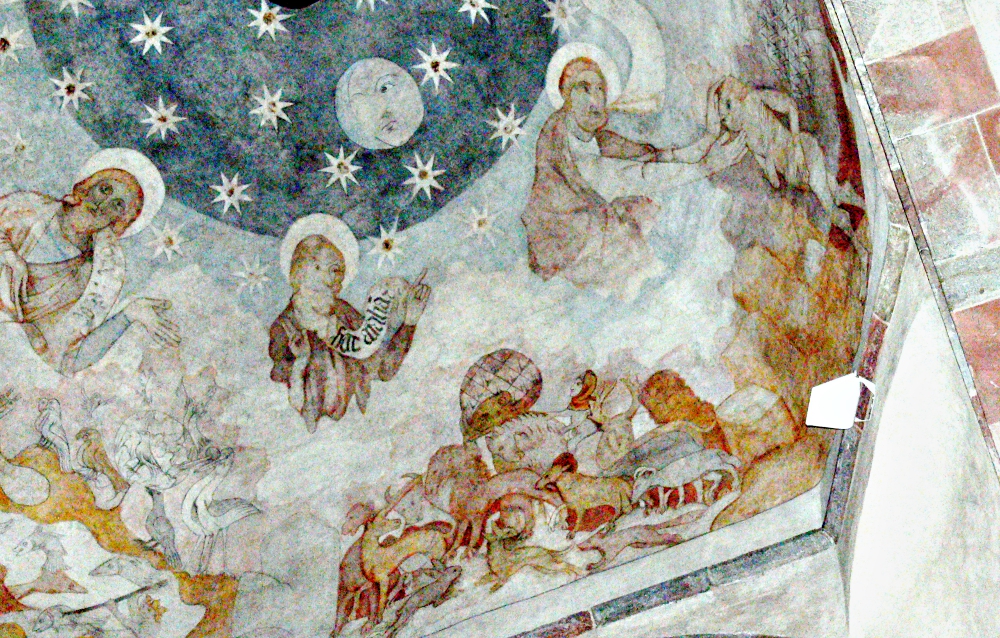
God creates the animals and Adam, depicted in a 13th-century fresco at Innichen Abbey, South Tyrol, Italy. (Wikimedia Commons/Wolfgang Sauber)
Editor's note: This blog post contains a spoiler for the novel Origin by Dan Brown.
I just finished reading Dan Brown's latest novel, Origin. It is a great read with all of the suspense-building that Brown is famous for. I soured a bit on Brown after The Lost Symbol. I found it too loaded down with codes and without the exciting buildup of his other novels. But Brown is back, and I believe you will find this book difficult to put down.
Of course, Brown has come in for much criticism in religious circles, even among Catholics. The Da Vinci Code was found to be unacceptable for suggesting that there may be offspring of Jesus of Nazareth still around. Most, however, were able to recognize that this was simply a fascinating story and not meant to be a theological or biblical treatise.
I am reminded that during my seminary years we were all mesmerized by Nikos Kazantzakis' The Last Temptation of Christ. That novel was not only interesting, but caused many of us to do some pretty deep thinking. When the stylized temptations we find in the Gospels were compared with what real human temptations Jesus might have experienced, we found ourselves wondering how we would have fared in similar circumstances.
My point here is that I think Catholics are often able to deal with such "shocking" material better than those in some other denominations are. Origin is a good case in point. It is essentially about a scientist who is out to prove that there is no God. For those who may be thinking about reading the book, you may want to treat this as a spoiler alert for the next paragraph.
Just as the scientist is about to announce his dramatic discovery, he is assassinated. At that point, the genius of Brown kicks in with his compelling narrative.
Catholics have a philosophical underpinning to their religion that tends to be stronger than it is for most other Christians. It is a philosophy that drives me crazy most of the time, with its penchant for natural law, metaphysics and epistemology, but, in this case, it is helpful.
When Thomas Aquinas utilized Aristotle to provide a deeper understanding of God, he helped us go beyond the anthropomorphic God of the Old Testament and even the personal relationship we have in Jesus.
The God who is unknowable and immaterial provides a stronger basis for dealing with scientific discoveries. It means we don't have to feel threatened every time a new theory is enunciated.
Aquinas identified a variety of ways to prove the existence of God. Of course, these proofs do not actually prove the existence of God, but their power comes from the fact that they cannot be disproved. At least that, I believe, is the case of the uncaused cause.
Whether you go back to the Big Bang theory, or a tiny molecule that evolves into the world as we know it, one can always say: But it was God who created the tiny molecule. Something ultimately had to be created ex nihilo, and God becomes that uncaused cause.
Catholics have always believed that faith and reason cannot be in conflict. Recent popes have had little difficulty accepting the possibility of evolution.
Advertisement
Other Christians who are wedded to a literal interpretation of the Bible have a truly difficult time dealing with any challenge to the Genesis narrative. Unfortunately, they wind up straining credulity to maintain their adherence to the literal word of God. I don't think anyone can truly believe that the world is like a teacup inverted over the land (the firmament of Genesis), and that God opens windows in the firmament to let the rain through. Yet this is the cosmology of the Old Testament.
The notion that the world was created in six 24-hour days is simply nonsensical. Even if the world is younger than what scientists posit, it could not have been a mere six days.
My concern is I believe fundamentalist Christians have trapped themselves in a world where they can no longer evaluate truth from fake news, and have thus been taken in to Donald Trump's orbit. If one must deny what we see in the world around us to remain faithful to the Scriptures, then why would one accept as true information that goes against other strongly held beliefs?
Jennifer Rubin's article in The Washington Post highlights some of these discrepancies with observable truth.
Evangelical Christians have been among the staunchest supporters of Trump. Rubin references a CNN focus group whose video has gone viral, where one says, "If Jesus Christ gets down off the cross and told me Trump is with Russia, I would tell him, 'Hold on a second. I need to check with the president if it's true.' "
We find ourselves in a world where an important segment of the population has given up on evaluating information based on objective analysis of facts. As Rubin says, "People who look to him [Trump] rather than their religious messiah are not going to change their minds based on real-world events."
I have no real answer to this dilemma. The education of children is certainly the best answer. Yet with home-schooling and parental influence, these beliefs continue to be perpetuated.
Rubin says we need to win elections with the majority we have, and keep trying to change the minds of others. I think she's right.





